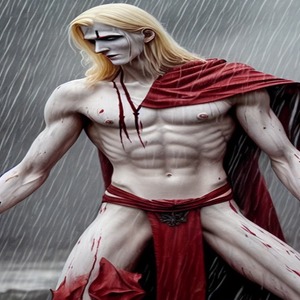Book of Gilgamesh:
The rhythmic thrum of many marching feet was drowned out by many more raindrops assaulting the arena earth. Rain was bad news in the best of combat circumstances, and a pure nightmare in the arena. There was no grass to soak up the moisture, so the pit quickly became a muddy, marshy soup.
Gilgamesh kicked off his sandals, ordering his men to do the same. He knew from experience that they would get sucked into the mud. Any surprises in the arena were an invitation to death. By far, the worst part about the rain is that there would be no spectators to witness his glorious feats.
“Shields at the ready, do not break your phalanx line, or we all die,” Gilgamesh yelled through the pouring rain. The men were afraid, and ignorant to the ways of combat, and so they obeyed without questions. It gave Gilgamesh a glimmer of hope that he may actually survive after all.
When they had marched to the center of the arena, Gilgamesh ordered his advancing unit to stop. With furrowed brow, he scanned the field for any sign of his foe. The arena became eerily still. Then, he felt it, the trembling of the earth below. It was muffled by the moisture, but there was no mistaking the marching of another unit of men.
“Nock your arrows. Line up your shields. Ready your sling. Level your spears,” Gilgamesh barked as he drew his blade. “Take a wide stance. Dig into the earth. Do not give them any ground.”
Gilgamesh heard a faint whistling through the open air and quickly ducked under the shield of his most forward-facing heavy infantryman. Just as he suspected, an arrow fell, but not against the shield. Instead, the arrow had buried itself in the mud, exactly where he had been standing only a moment ago. He nearly jumped out of his skin when another arrow buried itself into the shield he was leaning against.
The enemy archers were singling him out. It was a brilliant tactic really. Without his leadership, it would be much easier to dismantle the unit. He was the only one among them with combat knowledge. But how had they known his position? Could they see through the rainfall?
Another arrow thumped against the shield. The man holding it shifted nervously. “Do not lose heart. That is the quickest path to death,” Gilgamesh warned him. The man nodded hastily in agreeance, resetting his grip upon the shield.
Finally, Gilgamesh could see through the rain, a line of shields marching toward their position. Instead of a phalanx line, which was simply a horizontal line of shields, the opposing six men were in a wedge formation. Two shields at the front, two behind on either side, spears out.
A stone grazed the helmet of the man nearest to Gilgamesh, causing him to lose his footing in the mud for a moment. Gilgamesh held the man in position with his long, muscular arms, then scowled at him. “If you want to survive this, you’re going to have to do better than that.”
As the opposing unit of men closed in on their position, Gilgamesh could see they were equipped identically to his own unit. Two archers and a slingman, marching closely behind the shield formation. Behind them all, stood a tall, muscular, bare-breasted man with a general’s sword. His long blond hair billowed wildly in the wind of the storm. He had red war paint over his right eye in the shape of an emblem Gilgamesh had seen many times before, a horned crown, the insignia of Anu.
“Archers, slingman, focus your fire on that man,” Gilgamesh ordered. They obeyed. One fired and it sailed high and to the left, the other arrow fell several feet short of the enemy shield formation. The slingman did manage to throw a good rock, one that was sailing with a true course straight at the enemy general.
Gilgamesh watched in disbelief as the enemy general swatted the stone projectile away with a single swing of his sword, never losing his stride. Something did not feel right here. These men moved with a precision and purpose he had never seen before. Where were their battle nerves? Just how seasoned were these soldiers?
He did not have much time to think on that, as another volley of arrows and stone descended upon them. This time, the enemy ranged units fired high into the air, while their shield formation advanced swiftly, but not so quickly that they would beat the projectiles.
In fact, they were at a perfect, lock stepped pace. The projectiles would fall on Gilgamesh’s unit just a moment before their shield line. This meant his men would have to choose between shielding against the projectiles from above, or the spears from the front.










Comments (0)
See all